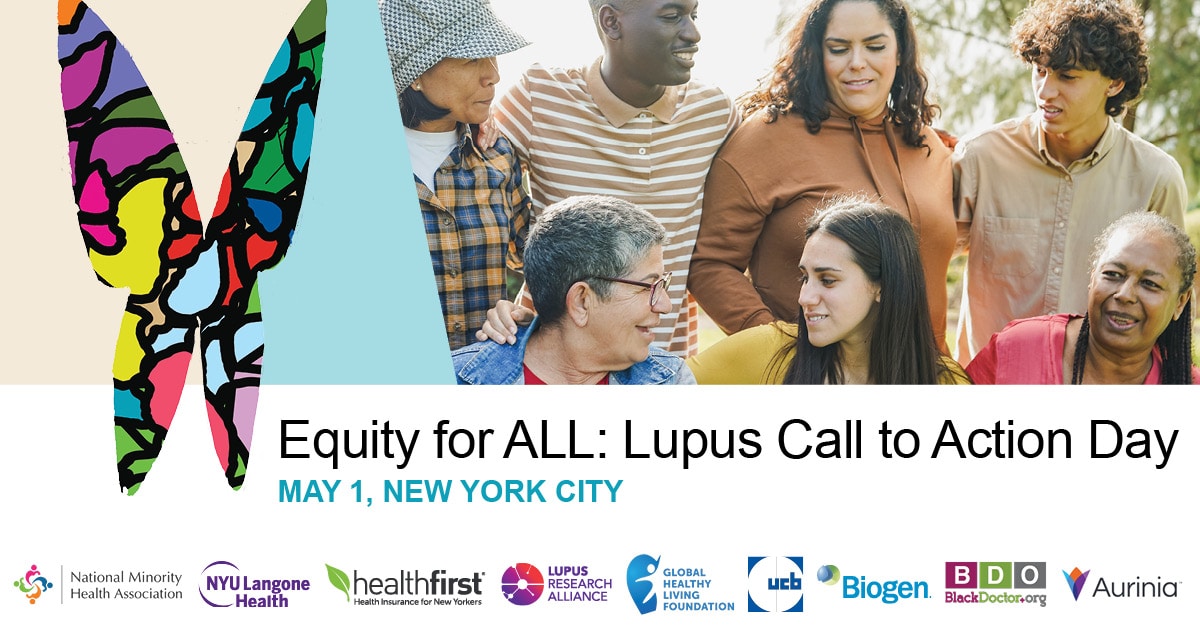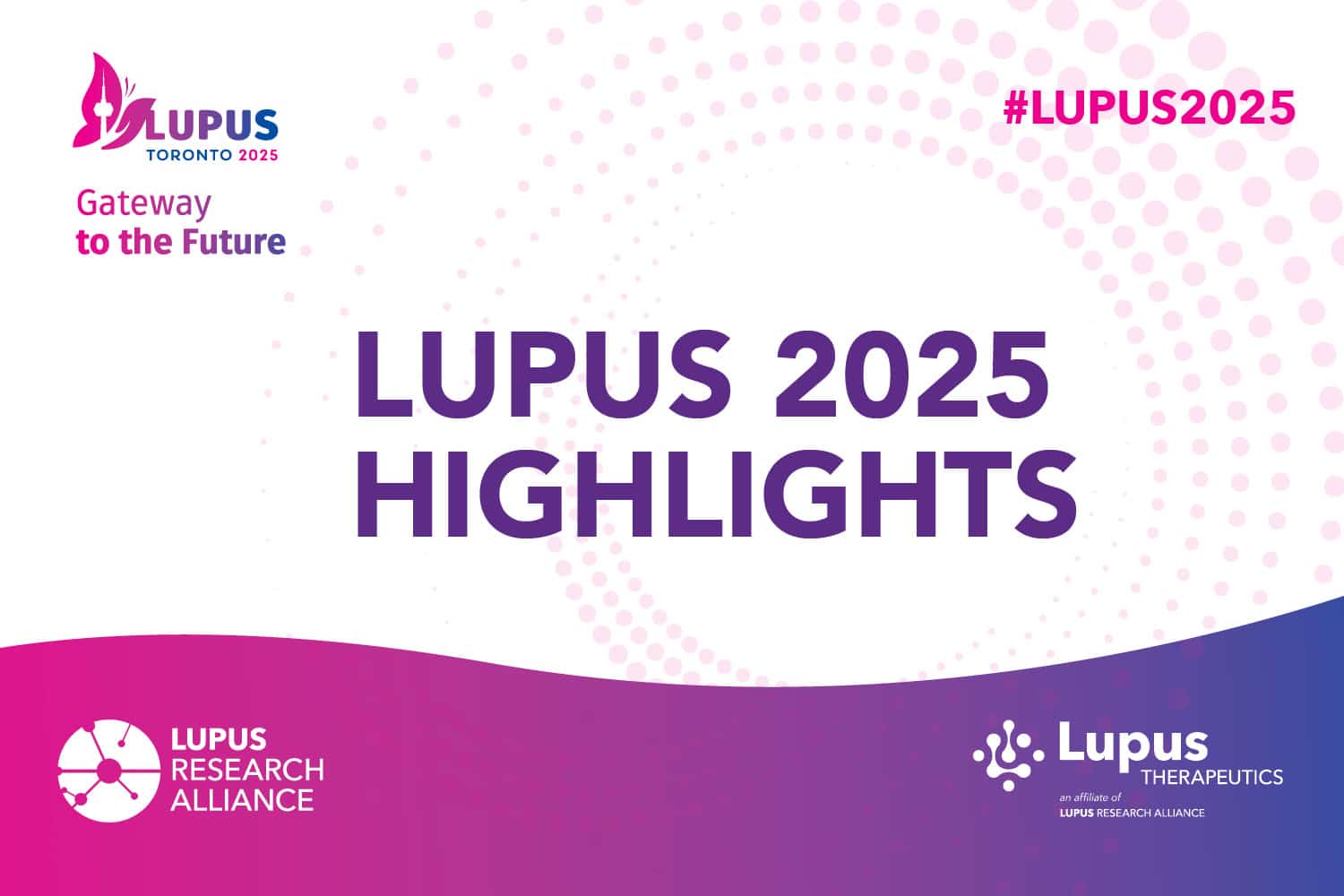On “Lupus Call to Action Day”, the Lupus Research Alliance and Lupus Therapeutics Amplify a Call for Equity and Inclusion

On “Lupus Call to Action Day”, the Lupus Research Alliance and Lupus Therapeutics Amplify a Call for Equity and Inclusion
As part of Lupus Awareness Month, May 1 has been declared “Lupus Call to Action Day” by the National Minority Health Association (NMHA) and members of the lupus community. Kicking off at NYU Langone Health in New York City, the high-profile platform is designed to drive awareness and enact change to improve equity and inclusion in lupus clinical trials and research.
As foundational partners of the initiative, the Lupus Research Alliance and its clinical affiliate Lupus Therapeutics will stand side-by-side with lupus health care providers, researchers and people living with lupus – including Toni Braxton, award-winning singer, songwriter, actress, producer, and entrepreneur, who will share her personal journey with lupus.
The NMHA “Lupus Call to Action Day” is a live, invite-only event at NYU Langone Health from 1pm to 3pm EST. BlackDoctor.org (BDO), one of the leading and most trusted health platforms for Black consumers, livestreamed this important program. For more information and to watch the videotaped program, visit: BlackDoctor Foundation.org Facebook page.
Tackling a Systemic Challenge
The Lupus Research Alliance is among the first organizations to identify and act on the significant racial disparities in lupus care among underrepresented minority populations. Black, Hispanic, Asian, and Native American populations are two to three times more likely to be diagnosed with lupus than white populations.
Lupus is the fifth and sixth leading cause of death among African American and Hispanic females ages 15-24 and 25-54 respectively – just behind cancer, heart disease and HIV – yet only 14 precent of clinical trial participants include African Americans with lupus.[i,ii] Evidence suggests that observed disparities in health outcomes in lupus are largely due to differences in opportunities to achieve optimal health. have long been strongly advocating to end the disparities of low participation and underrepresented minorities in lupus clinical trials and research and are uniquely positioned to change the clinical trial experience for people of color with lupus.
A few examples of LRA and Lupus Therapeutics initiatives include Project CHANGE by Lupus Therapeutics (Community-based Health Action Network to Generate Trial Participation and Eliminate Disparities) which focuses on a community-based participatory research approach to addressing health inequities and disparities in clinical trials. The nationwide program involves the development of multifaceted, comprehensive action plans that increase meaningful, equitable, and supported clinical trial awareness, participation, and retention (engagement) among Black/African American people living with lupus. Co-led by each research institution and a Black individual living with lupus, a collaborative team in three pilot locations are working with patients; hospitals; healthcare providers; women’s health groups; medical and nursing associations; medical, community-based, faith-based, and grass root organizations; as well as community leaders to tailor a specific Action Plan that fits each of their community’s specific and unique needs.
Additionally, through the Lupus Clinical Investigators Network (LuCIN), Lupus Therapeutics offers the LuCIN Health Equity Working Group and Health Equity Advisory Services to identify strategies, efforts, and resources needed to enable the network to increase health equity and improve diverse representation in lupus clinical trials. Leveraging the collective expertise of the LuCIN Community Health Equity Working Group, Lupus Therapeutics offers health equity advisory services specializing in evaluating and advising on study design and materials to enhance diversity, equity, and inclusion (DEI).
The Patient Advocates for Lupus Studies (PALS) is another program designed to increase and diversify clinical trial participation. Individuals living with lupus who had previously participated in a clinical trial provide early, trial agnostic, education to other individuals living with lupus about clinical trials. The program draws on the social support model, which has shown to be effective in communities of color (particularly Black women) in terms of how individuals interact with the healthcare system.
The LRA has also launched a comprehensive Diversity in Lupus Research Program that includes financial support for outstanding early-career underrepresented minority scientists, postdoctoral research fellows, and promising minority trainees working with LRA-funded researchers or lupus investigators. Additionally, the program provides access to quality mentorship by leading lupus investigators, access to opportunities and resources for scientific and professional development, and a supportive network of peer scientists.
Lupus Therapeutics recently launched the Lupus Therapeutics Healthcare Provider Directory™, which serves as a great resource to access care around the country, but also a way to find out about local clinical trials. People with lupus are encouraged to visit the Lupus Therapeutics website to access the Directory.
Spreading the Word Throughout Lupus Awareness Month
The LRA and Lupus Therapeutics encourage our lupus community to amplify the message of health equity and lupus awareness throughout Lupus Awareness Month by:
- Joining us this Saturday, May 4 at MetLife Stadium for our annual New Jersey Walk with Us to Cure Lupus – it is a great community event right at the stadium, and you can help raise funds to support research!
- Downloading our ready-to-use social media toolkit to leverage the assets and ensure your voice is heard – and awareness about lupus and lupus research are shared.
- Stay tuned to register for an upcoming live webinar on emerging cell therapies which are showing great promise.
References:
[i] Yen, E. Y. and Singh, R. R. (2018), Brief Report: Lupus—An Unrecognized Leading Cause of Death in Young Females: A Population‐Based Study Using Nationwide Death Certificates, 2000–2015. Arthritis Rheumatol, 70: 1251-1255. doi:10.1002/art.40512.
[ii] Falussuni, et al. 2018. The Representation of Gender and Race/Ethnic Groups in Randomized Clinical Trials of Individuals with Systemic Lupus Erythematosus.



